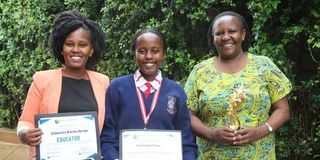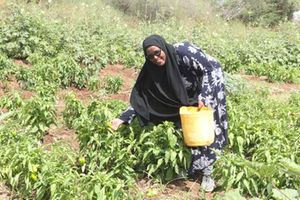
Lavington Girls Secondary School teacher Scholastica Wairimu, student Diana Wangari Kibugi and head teacher Jane Mwangi on November 15, 2024.
In the face of the climate crisis, research and innovation in agriculture is the way to go.
Adopting better farming techniques will boost the transition to better livelihoods for smallholder farmers, crop resilience, as well as improve food security and nutrition.
Young people are poised to come up with solutions and new agricultural techniques to combat challenges associated with the hunger ravaging most parts of the continent.
Lavington Girls Secondary School in Nairobi is on the international map, having represented the country in a prestigious contest.
Diana Wangari Kibugi, a Form Four student, has been feted for taking part in the Global Youth Institute Conference.
Dubbed World Food Prize Foundation, it was held in Des Moines, Iowa, in the United States from October 29 to 31.
“The World Food Prize organises research for students all over the world every year. You carry out research on a topic. I focused on malnutrition in Nigeria,” the 17-year-old says.
The project was presented at the Kenya Agricultural and Livestock Research Organization (Kalro), emerging the best in the country.
As a result, Diana flew to the US with one of her teachers – Scholastica Wairimu – who helped in her preparation and presentation.
Wairimu says the school’s Agriculture Club has 129 members. The club members are passionate about environmental sustainability and farming innovations.
“The research the World Food Prize Foundation Global Prize for Innovation that our student pursued applies to the Kenyan context too. Many of the projects developed under this initiative focused on solving pressing challenges, including battling hunger, carrying out sustainable farming practices and conserving the environment,” she says.
Students who took part in the challenge were given a chance to come up with impactful solutions that can enhance the livelihoods of communities while also addressing global sustainability goals.
“These initiatives empower students to think critically and act responsibly, ensuring that their innovations are not only effective but also culturally relevant and beneficial to our society,” the teacher says.
The first step in the programme is picking a country of one’s choice. This is followed by selecting a topic with an agenda anchored on food security.
The topics include water shortage, hunger, malnutrition and conflict.
The teenager then engaged in research on the impact of the issue, incorporating statistics. She proposed possible solutions.
Her focus was on low-income families and farmers helping combat food insecurity.
“It is through smallholder farmers that most families get food. If families do not have enough money, they cannot engage in farming,” she says, adding that her research project is applicable to Kenya as malnutrition is also rife here.
There is usually no funding to support food systems, and counties such as Turkana, Marsabit, Moyale and Mandera are severely affected by drought.
Global warming has also affected food security, with Nyeri, Trans Nzoia, Laikipia and other food basket regions feeling the heat.
Diana says the impact of malnutrition in Africa, particularly Nigeria, is what drove her to join the programme.
The teenager, who wants to study law and international relations, thanks her teachers for giving her the opportunity and encouraging her to take part in the international competition.
“My principal Jane Wangari Mwangi and Agriculture Club patron encouraged me and other students to take part in the challenge,” she says.
Diana sees herself as a lawyer and researcher in the future. Her dream is to address problems in communities.
Ms Mwangi says Lavington Girls Secondary School is excited to have taken part in the challenge.
She says the challenge aims to help address global food security issues and make young people’s voices be heard.
“Diana represented the school and the country well. Her future looks bright as she is focused addressing food insecurity and other problems that the poor people face worldwide,” the head teacher says.








